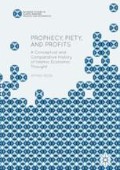Abstract
This chapter introduces an Islamic perspective to this debate, by examining views from Islamic scripture, traditions, and the opinions of past and contemporary Islamic theologians, exegetes, philosophers, and economists. In particular, we examine the Islamic concept of the vicegerency of man and the commensurability of God’s creation as the basis for the Islamic position on the subject of abundance and scarcity. The chapter highlights many similarities with the views of other schools of thought, such as the Greek and Christian traditions.
Access this chapter
Tax calculation will be finalised at checkout
Purchases are for personal use only
Notes
- 1.
According to Maududi (1992, 11), the “real” economic problem is defined as: “how to arrange economic distribution so as to keep all men supplied of the necessities of existence and to see that every individual in society is provided with opportunities adequate to the development of his personality and the attainment of the highest possible perfection according to his capacity and aptitude.”
- 2.
All excerpts from the Qur’an are based on the new translation and commentary, The Study Quran, by Seyyed Hossein Nasr (2015).
- 3.
See also: 14:32–34; 18:7–8; 45:12–13; 31:20; 2:29 and 50:6–11.
- 4.
See also 2:243; 7:10; 10:60; 12:38; 23:78; 32:9; 40:61 and 67:23.
- 5.
See also 12:26; 29:62; 30:37; 34:36 and 39:36.
- 6.
A similar message is reiterated in verses 42:38 and 36:47.
References
———. 1986. Contemporary Man and the Social Problem. Tehran: WOFIS.
———. 2003. Al Islam Yaqudu Al Hayat. Beirut: Dar Al Taaruf Publications.
———. 2010. Iqtisaduna. Trans. Kadom J. Shubber. London: MECI.
Barrera, Albino. 2005. God and the Evil of Scarcity: Moral Foundations of Economic Agency. Notre Dame: University of Notre Dame Press.
———. 2006. Wealth as Abundance and Scarcity. In Rediscovering Abundance, ed. Helen Alford et al. Notre Dame: University of Notre Dame Press.
Dobson, Andrew. 1993. Jean-Paul Sartre and the Politics of Reason. Cambridge: Cambridge University Press.
Dupuy, Jean-Pierre. 2013. The Mark of the Sacred. Stanford: Stanford University Press.
Haughey, John C. 2006. A Pauline Catechesis of Abundance. In Rediscovering Abundance, ed. Helen Alford et al. Notre Dame: University of Notre Dame Press.
Kamali, Mohammad Hashim. 2015. The Middle Path of Moderation in Islam: The Quranic Principle of Wasatiyyah. New York: Oxford University Press.
Karayiannis, Anastassios D. 1994. The Eastern Christian Fathers (A.D. 350–400) on the Redistribution of Wealth. History of Political Economy 26 (1): 39–67.
Maududi, Abul A’la. 1992. The Economic Problem of Man and Its Islamic Solution. Lahore: Islamic Publications.
Mullainathan, Sendhil, and Eldar Shafir. 2013. Scarcity: Why Having So Little Means So Much. New York: Picador.
Nasr, Seyyed Hossein. 2015. The Study Quran. New York: HarperOne.
Xenos, Nicholas. 1989. Scarcity and Modernity. London: Routledge.
Author information
Authors and Affiliations
Copyright information
© 2018 The Author(s)
About this chapter
Cite this chapter
Reda, A. (2018). Abundance and Scarcity: Islamic Economic Thought. In: Prophecy, Piety, and Profits. Palgrave Studies in Islamic Banking, Finance, and Economics. Palgrave Macmillan, New York. https://doi.org/10.1057/978-1-137-56825-0_7
Download citation
DOI: https://doi.org/10.1057/978-1-137-56825-0_7
Published:
Publisher Name: Palgrave Macmillan, New York
Print ISBN: 978-1-137-56824-3
Online ISBN: 978-1-137-56825-0
eBook Packages: Economics and FinanceEconomics and Finance (R0)

